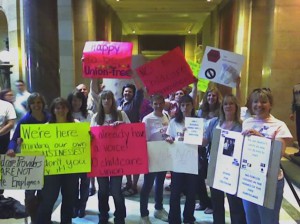
I was at the Minnesota Capitol again today, to express my oppostion to HF 950 – the Family Child Care Providers Representation Act. I plan to go down there again tonight.
This bill is a strange one. For starters, day care in Minnesota is dominated by thousands of in-home operators, many of whom are unlicensed because they care for their relatives, or just a single family. Of the others, many are run by a single person, or a person and an assistant. They are small businesses in every sense of the word. They operate out of their homes. They don’t make a lot of money. They value the independence and flexibility of running their own businesses. They like being able to choose how they run their businesses. Precious few of these operators have any interest in joining a union. In fact, they can do so now, but clearly don’t want to. In the debate in the MN senate on this same legislation (Senate bill SF 778) one of the senators in the debate pointed out that of the 11,000 providers, only 57 of them have opted to join the union. This is not exactly a groundswell.
So, we have a child care industry dominated by small business that has no interest in unionizing. How does passing a law unionize this industry? By what logic is a union applied to small business owners? With whom would the union “negotiate”?
First of all, the bill does not directly force providers to unionize. What it does is set up a rigged game that allows the AFSCME to “organize” these independent businesses. Providers that getCCAP (subsidy payments) from the state are declared by law to be employees of the state. These “employees” can vote in a union election. Providers that do not receive CCAP cannot vote. All providers are subject to the election’s outcome. If unionized, providers who serve even a single subsidized child must submit to union dues, rules and oversight.
The reason for the push for unionization is muddled. It is clear that AFSCME, the union working so hard to “unionize” these businesses would reap a windfall of either full dues or “fair share” dues. There are millions of dollars at stake, and it’s obvious why the union would want the money and the members.
It is less clear why the DFL members of the legislature would want to do this. Political payback would be one reason. Union support is a big part of the Democratic Farmer Labor party, of course. Another suggestion I heard today is that DFLers want to raise CCAP funding rates, but don’t want to pay the political cost of doing it directly. They want to get the union to “force them” to do it.
Whatever the reason is, it does not seem to affect the GOP, who are unanimous in opposing this bill.
The Star Tribune reports that this legislation (HF 950) will be brought up for debate “this legislative day”.
The fact that these are small business owners, and not employees, appears to be lost on supporters of this legislation. The best explanation I have heard is that because the businesses get CCAP funding, they are actually employees of the state. If that is true, just about everyone in Minnesota is an “employee” of the state, because between Medicaid, SNAP (food stamps), housing assistance, and unemployment insurance, just about every citizen in Minnesota either works for, or runs a business that “receives” subsidies.
Once in place, AFSCME would quickly go to work “negotiating” with the “employer” – the State of Minnesota. These proud, independent, business owners would be sidelined.
While talking to the providers today, I was impressed by the passion they showed for what they do. They have the future of our youth in their hands. They are worried about the increasingly heavy hand of government, and the possible suppression of their faith, and their freedom. They think the CCAP program is likely to become mandatory, and I think they are right. As with other subsidies, they don’t come for free. Those who pay call the tune.
This is bad legislation. It is little more than a union power and money grab dressed up as an “opportunity” to unionize. It is a payback to the unions, and a slap in the face to the people being unionized. It richly deserves to be voted down.
I am going back to the capitol now. I’ll do what I can to remind the legislators that this is not what they were sent to St. Paul to do. They have work to do balancing budgets, and only a few precious days to get them done. The hard-working child care providers of Minnesota do not deserve this raw deal.

